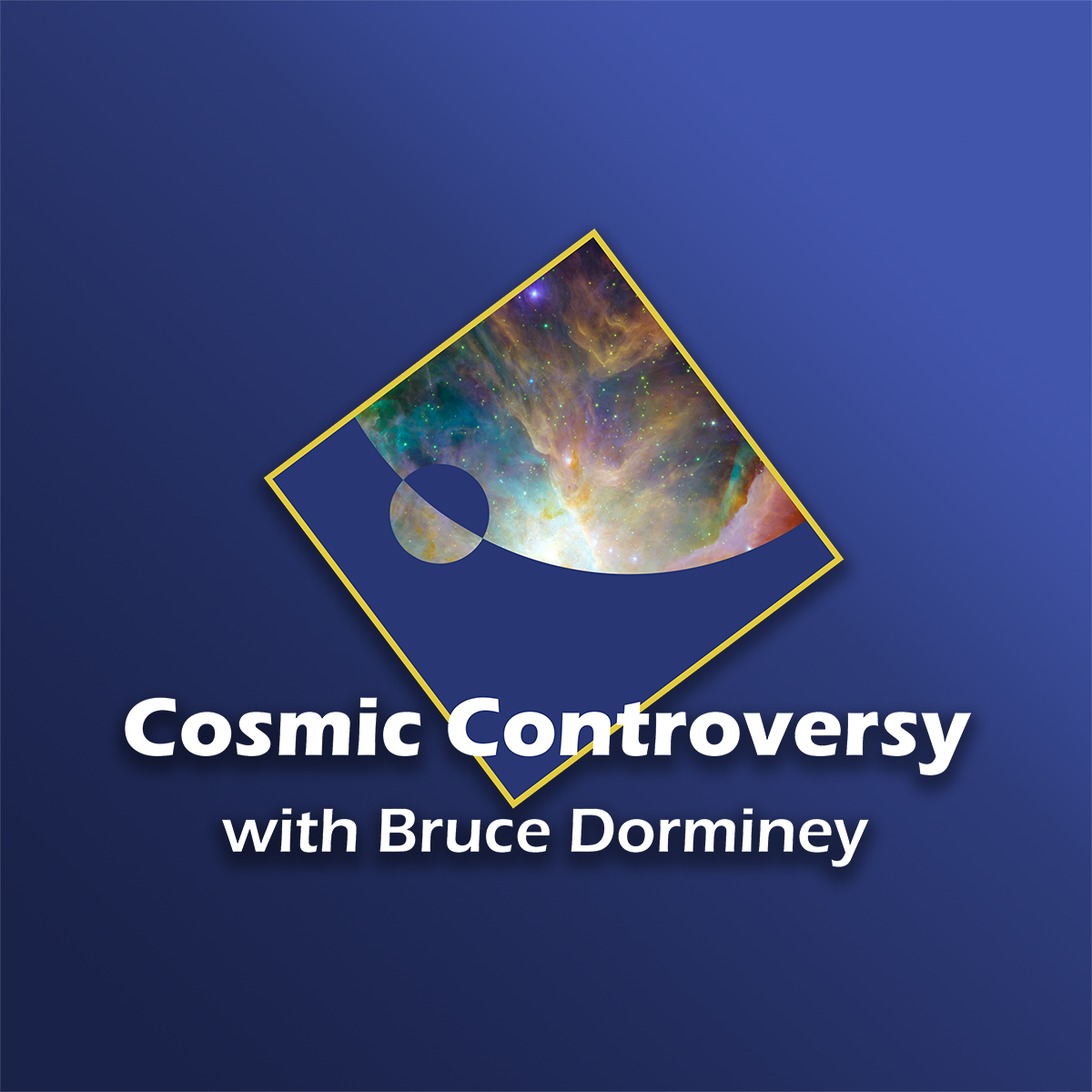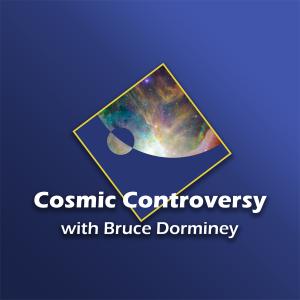
32K
Downloads
67
Episodes
Cosmic Controversy covers past and present issues in aerospace and astronomy with your host --- science journalist, Forbes contributor and ”Distant Wanderers: The Search for Planets Beyond the Solar System” author Bruce Dorminey.
Cosmic Controversy covers past and present issues in aerospace and astronomy with your host --- science journalist, Forbes contributor and ”Distant Wanderers: The Search for Planets Beyond the Solar System” author Bruce Dorminey.
Episodes

Friday Dec 04, 2020
Episode 27 --- Why Mars Went Wrong
Friday Dec 04, 2020
Friday Dec 04, 2020
NASA’s MAVEN orbiter has arguably done more to document how and why Mars lost its atmosphere and much of its water than any spacecraft ever sent to the red planet. The mission’s principal investigator, planetary scientist Bruce Jakosky is this week’s featured guest and we discuss the current paradigm on why Mars went so horribly wrong. Jakosky offers a candid and inside look at how such missions work and what we can expect from Mars science in the next few years.

Friday Nov 27, 2020
Friday Nov 27, 2020
The earliest days of robotic space exploration, to the Moon, Venus, Mars, and even Mercury, likely would never have played out in such dramatic fashion in the late 1950s and early 1960s without the Cold War. Despite a steep learning curve with lots of rocket misfires and mission malfunctions, it was a hair-trigger era of interplanetary exploration that offered the world its first close up views of our nearest planetary neighbors. Former NASA Chief Historian Roger Launius and I discuss the details in this revealing episode.

Friday Nov 20, 2020
Episode 25 --- Getting To Know Andromeda, Our Grand Spiral Neighbor
Friday Nov 20, 2020
Friday Nov 20, 2020
First cataloged by Al Sufi as a mere optical smudge high in the winter sky, the Andromeda Galaxy has lately been a cornerstone of everything we know about contemporary astronomy and the cosmos as a whole. Join Lowell Observatory astronomer Philip Massey as he outlines how this grand spiral neighbor changed what we know about cosmology. And if you happen to be in the Northern hemisphere, by the end of the episode, you may be ready to try and spot the galaxy with just your naked eyes.

Thursday Nov 12, 2020
Episode 24 --- How Oxygen Transformed Our Planet Earth
Thursday Nov 12, 2020
Thursday Nov 12, 2020
From Pachyderms to Cetaceans, the largest mammals on Earth would arguably never have evolved to their gargantuan sizes without the third most abundant element in the Cosmos --- Oxygen. Of course, life, even photosynthesis is possible without Oxygen, but for the cosmos to evolve the big-headed space aliens of our sci-fi dreams will likely take Oxygen --- the most efficient energy carrier in the periodic table. How Oxygen became dominant on our own planet is the focus of today’s episode with guest Timothy Lyons, a biogeochemist at the University of California, Riverside.

Friday Nov 06, 2020
Episode 23 --- China’s Space Agenda Gets Serious
Friday Nov 06, 2020
Friday Nov 06, 2020
China is building on a decade of lunar exploration with this month’s launch of its Chang’e 5 sample return mission; China has an orbiter and lander halfway to Mars; and by 2022 plans on putting a permanently crewed 60-ton space station in low-Earth orbit. They even have long term plans for mining Helium-3 on the Moon. In this episode, China space expert David Burbach of the U.S. Naval War College discusses these and other issues, in particular, how the current election will affect NASA’s own Artemis schedule and China as a potential threat beyond low-Earth orbit.

Friday Oct 30, 2020
Episode 22 --- The Far Future Of Our Universe (Turtles All the Way Down)
Friday Oct 30, 2020
Friday Oct 30, 2020
What happens when all the stars in our cosmos’ galaxies burn out; with little or no hydrogen gas left to fuel star formation; and everything pretty much turns to toast? It will presage an age of black holes where extremely low temperatures and fundamental particle decay will alleviate life as we know it. This universal endgame in an almost infinite far future may actually be a Dark Age where little or nothing can happen. And if it does, only on the longest timescales. Yale University astrophysicist Gregory Laughlin and I discuss these and other issues in this cosmological “turtles all the way down” episode of the podcast.

Friday Oct 23, 2020
Episode 21 --- How Aircraft Propellers Drove The Aeronautical Revolution
Friday Oct 23, 2020
Friday Oct 23, 2020
Without the lowly propeller, global trade and commerce and freedom of movement as we knew it prior to Covid would have never had the opportunity to flourish. Special guest Jeremy R. Kinney, Chair of the Aeronautics Department at the Smithsonian Institution’s National Air and Space Museum in Washington, D.C., provides a fascinating narrative to how and why advances in aircraft propeller technology enabled aerospace to revolutionize global warfare, travel, and trade. Author of “Reinventing the Propeller,” Kinney and I discuss many underappreciated aspects of this aeronautical workhorse.

Friday Oct 16, 2020
Episode 20 --- The Case for a Lunar Science Moon Rush
Friday Oct 16, 2020
Friday Oct 16, 2020
Notre Dame Planetary Geologist Clive Neal stops by the podcast for a terrifically candid discussion of why the Moon has to be the first stop en route to Mars. We talk about why the Moon holds the key to the new Space Economy; the prospects for NASA making its 2024 Artemis mission deadline; and, why lunar samples are still being analyzed 50 years hence. Why more lunar samples and lunar seismometers are keys to understanding our inner solar system. And why it’s imperative that we revisit the Moon in a permanent way if we are ever to make Mars our own. We also mull over the politics of all of this three weeks away from a pivotal presidential election.

Thursday Oct 08, 2020
Episode 19 --- The Trouble With Mercury: Our Solar System's Bizarre Innermost Planet
Thursday Oct 08, 2020
Thursday Oct 08, 2020
Guest Catherine Johnson, a planetary geophysicist at the University of British Columbia in Vancouver, discusses this bizarre little world; the innermost planet in our solar system. A planet that’s so close to our Sun that its surface temperatures can hit 800 F. But surprisingly, its poles harbor enough water ice to completely bury a major metropolis. Some have even argued that Mercury may have once been habitable. Where it formed still remains a mystery, but it does have a tiny magnetic field, a very oversized iron core, and one of the largest impact basins in the solar system. A European mission is currently en route to orbit the planet in 2025.

Saturday Oct 03, 2020
Episode 18 --- The Heyday of Flying by the Stars
Saturday Oct 03, 2020
Saturday Oct 03, 2020
Retired commercial pilot, crash investigator, and aviation attorney Gary LaPook joins me to discuss the development and practice of celestial air navigation in passenger aircraft; how it worked; why it was replaced; where it could go wrong, and why celestial air navigation is still vital to our national security.
